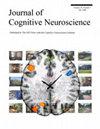The Neural Corelates of Constructing Conceptual and Perceptual Representations of Autobiographical Memories
IF 3
3区 医学
Q2 NEUROSCIENCES
引用次数: 0
Abstract
Contemporary neurocognitive frameworks propose that conceptual and perceptual content of autobiographical memories—personal past experiences—are processed by dissociable neural systems. Other work has proposed a central role of the anterior hippocampus in initially constructing autobiographical memories, regardless of the content. Here, we report on an fMRI study that utilized a repeated retrieval paradigm to test these ideas. In an MRI scanner, participants retrieved autobiographical memories at three timepoints. During the third retrieval, participants either shifted their focus to the conceptual content of the memory, the perceptual content of the memory, or retrieved the memory as they had done so on previous trials. We observed stronger anterior hippocampal activity for the first retrieval compared with later retrievals, regardless of whether there was a shift in content in those later trials. We also found evidence for separate cortical systems when constructing autobiographical memories with a focus on conceptual or perceptual content. Finally, we found that there was common engagement between later retrievals that required a shift toward conceptual content and the initial retrieval of a memory. This final finding was explored further with a behavioral experiment that provided evidence that focusing on conceptual content of a memory guides memory construction, whereas perceptual content adds precision to a memory. Together, these findings suggest there are distinct content-oriented cortical systems that work with the anterior hippocampus to construct representations of autobiographical memories.构建自传体记忆的概念和感知表征的神经核心环节
当代神经认知框架认为,自传体记忆的概念和感知内容--个人过去的经历--是由可分离的神经系统处理的。其他研究则提出,无论自传体记忆的内容如何,前海马体在最初构建自传体记忆时都扮演着核心角色。在此,我们报告了一项利用重复检索范式来检验这些观点的 fMRI 研究。在磁共振成像扫描仪中,参与者在三个时间点检索自传体记忆。在第三次检索过程中,参与者要么将注意力转移到记忆的概念内容、记忆的感知内容上,要么按照之前的试验方法检索记忆。我们观察到,与后面的检索相比,第一次检索的海马前部活动更强,无论后面的试验内容是否发生了转变。我们还发现,在构建侧重于概念或感知内容的自传体记忆时,有证据表明大脑皮层系统是独立的。最后,我们发现,在需要转向概念内容的后期检索和记忆的初始检索之间存在共同的参与。我们通过一项行为实验进一步探讨了这一最终发现,实验证明,关注记忆的概念性内容能引导记忆的构建,而知觉性内容则能提高记忆的精确度。这些发现共同表明,存在着不同的以内容为导向的大脑皮层系统,它们与前海马共同构建自传体记忆的表征。
本文章由计算机程序翻译,如有差异,请以英文原文为准。
求助全文
约1分钟内获得全文
求助全文
来源期刊
CiteScore
5.30
自引率
3.10%
发文量
151
审稿时长
3-8 weeks
期刊介绍:
Journal of Cognitive Neuroscience investigates brain–behavior interaction and promotes lively interchange among the mind sciences.

 求助内容:
求助内容: 应助结果提醒方式:
应助结果提醒方式:


